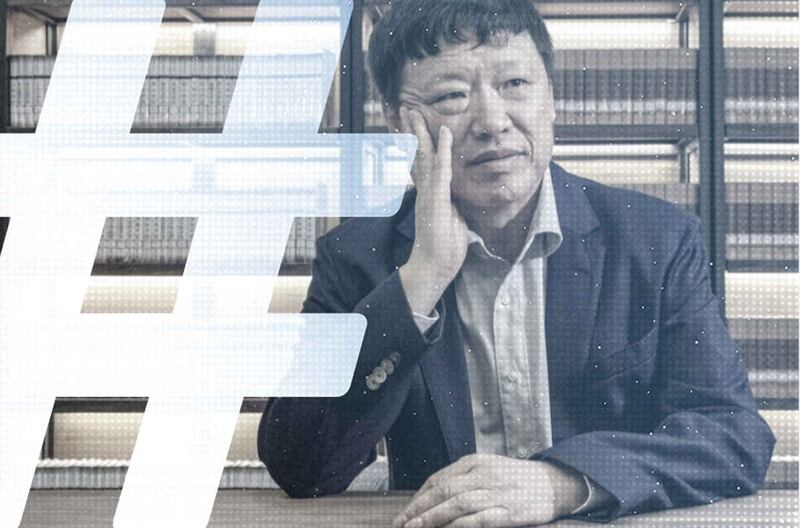“Washington has greatly increased its presence in the South China Sea and intervened in the political process here,” said a middle-aged man seen in a video clip, speaking slowly and calmly in heavily accented English, his eyes fixed on the camera throughout.
Wearing a dark teal shirt and sporting a simple front brush haircut, the man looked benign, almost humorous. But he didn’t mince his words, calling the U.S. State Secretary Antony Blinken’s key speech in Jakarta earlier this week “insincere and shallow talk” and “just an old song and dance routine.”
This is Hu Xijin, editor of the Global Times—the hawkish tabloid sister of the Chinese Communist Party’s mouthpiece People’s Daily—dubbed by some as “China’s Fox News.”
The Global Times is one of the only two English-language national newspapers in China, though it is published in Chinese, too. The other one is China Daily, also published by the Communist Party.
Hu was doing his regular videocast, aptly named ‘Hu Says’, one day before he announced on the microblogging website Weibo that he’s retiring from the Global Times editor position but will continue contributing as a special commentator.
“I have retired and my new role is Global Times special commentator. I will continue to speak on Twitter,” he wrote on the U.S. platform, which I banned in China.
“I know that many Western people don’t like me, but after all, I am one of the leading influencers in China's public opinion sector. One should hear opinions from both sides.’
Until now Hu has been the sole editor-in-chief of the Global Times which he helped launch in 2009.
Under his helm it became "the most outspoken newspaper on foreign affairs" in China, as described by the China Media Project research program at University of Hong Kong. And controversial too, as it did not shy from covering stories considered "politically sensitive", such the Tiananmen Square Massacre in 1989 or the house detention of dissident lawyer Chen Chuangcheng.
“From the day it was launched, the Global Times tentatively broke away from the journalistic tradition seen as normal in the Chinese media landscape, which avoids touching upon conflict and confrontation,” the paper boasts on its ‘About Us’ page.

Beijing’s propagandist
But Hu is also one of China’s most vociferous propagandists who launched frontal attacks on the United States and western democracies as well as western media which he accuses of “demonizing China”.
Hu and the Global Times also defend Beijing and its policies zealously, sometimes verging on hyper-nationalism.
In an opinion column in November about Australia's military support to the U.S., he called Washington "the world's bully, and Australia's role is like a barking dog."
“In the face of such an irrational Australia, shouldn't China be prepared with an iron fist and to punch it hard when needed, teaching it a thorough lesson?” Hu asked.
A prolific Twitter user, he regular employs the platform to blast foreign governments and agencies for their criticism of China’s policies and human rights records, often citing his “own sources” to imply his political connections and bend the facts.
His tweets are in English, exclusively targeting foreign audiences as Twitter is firewalled and therefore off-limits to most ordinary Chinese mainlanders.
But his outrageous style got him attention from international news outlets, making Hu one of the most quotable Chinese media personalities.
Besides attacking the American political system and politicians that he says "stink of rubbish" and are "bellicose", Hu has also been vocal about Taiwan and the South China Sea.
In July, when the Royal Navy's HMS Queen Elizabeth aircraft carrier entered the disputed waters for a freedom of navigation joint exercise with some ally countries, British media quoted Hu as branding Britain a " bitch asking for a beating."
"To say it precisely, if the UK wants to play the role to coerce China in the South China Sea, then it is being a bitch. If it has any substantial move, it is asking for a beating," Hu was quoted as saying.
He also threatened that China would "make an example" of the British fleet.
Hu aggressive tone and “highly visible international remarks in recent days or weeks” may have led to his removal from his post, the China Media Project said, saying there might be concerns at the top of the Communist Party’s leadership about him and his newspaper.
But some Chinese analysts, like Andy Mok, a well-known media commentator, said it’s just that Hu is approaching 62, the “right age of retirement” in China.
Hong Kong's pro-CCP Sing Tao Daily newspaper reported that Hu will be replaced as a columnist by the People's Daily op-ed vice director Fan Zhengwei, and as editor-in-chief by People's Daily international section deputy director Wu Qimin.
Wu is described by Chinese media sources as "competent," "rational" and "modest."

